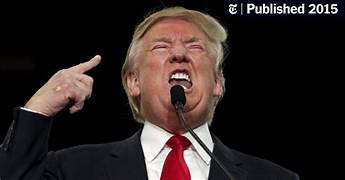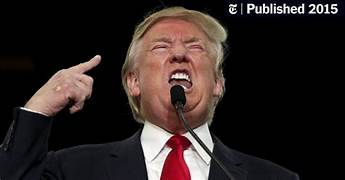Schmittian Moments 5


'Trump’s entire political style is to create, amplify, and inhabit states of exception - real or imagined. The border is always under invasion. The election is always stolen. The culture is always collapsing. The liberal elite is always conspiring.'
Carl Schmitt’s political theology, when applied to the politics surrounding Donald Trump, reveals a structure of meaning that helps explain the intensity and character of contemporary right-wing populism in the United States.
Schmitt’s notion that “sovereign is he who decides on the exception” is not simply a juridical claim, but a theological one. The sovereign stands outside the legal order, not because he breaks it, but because he constitutes it. In Trump’s politics, this sovereign logic is made manifest not through an explicit philosophical argument, but through the performance of decision in the face of liberal paralysis. His followers often portray him as the only figure capable of “getting things done,” of restoring order, of saying what cannot be said within the limits of political correctness or elite discourse. His willingness to defy established norms and even constitutional constraints, such as in his declaration of a national emergency to secure funding for the border wall, or his efforts to overturn the 2020 election, expresses precisely the kind of decisionism Schmitt identified at the heart of political authority.
Moreover, Trump’s movement is organized around a stark friend-enemy distinction, the very kernel of Schmitt’s concept of the political. For Schmitt, the political is defined not by deliberation, compromise, or procedural fairness, but by the drawing of existential lines between “us” and “them.” Trumpism exemplifies this with its rhetoric of internal enemies: the deep state, fake news, radical leftists, globalists, and RINOs. These enemies are not simply opponents in a contest of ideas; they are seen as illegitimate, dangerous, and corrosive to the life of the nation. The political energy of the Trumpian base arises not from the pursuit of policy goals in the liberal sense, but from the affirmation of collective identity through conflict.
This intensification of political theology is evident in the religious inflection of Trump’s image. Despite his personal distance from traditional piety, Trump is sacralized by parts of the evangelical right. He is referred to as a “modern-day Cyrus,” an imperfect but divinely chosen leader, or as the “last great hope” against the moral and cultural decay attributed to secular liberalism. The logic at work here is Schmitt’s katechon, the force that holds back the end times. Trump’s role in the imagination of his supporters is not simply political but eschatological: he stands between order and chaos, tradition and dissolution, America and its enemies. This idea was starkly visible in the January 6 Capitol insurrection, where religious symbols, Trump flags, and American iconography fused into a vision of apocalyptic salvation. The state was no longer the bearer of order; Trump himself had become the bearer of legitimate authority, even as he moved outside the law.
Trumpism also thrives on the sense of perpetual crisis, which for Schmitt is not a pathology but a constitutive element of sovereignty. Trump’s entire political style is to create, amplify, and inhabit states of exception, real or imagined. The border is always under invasion. The election is always stolen. The culture is always collapsing. The liberal elite is always conspiring. This permanent crisis becomes the ground upon which a new order can be declared. As Schmitt argued, the normal is not the basis of political authority; the exception is. Trump does not promise to manage institutions; he promises to reset them. The rule of law is less important than the reassertion of a political will capable of founding a new order.
This helps explain the quasi-miraculous way in which Trump is experienced by his supporters. His political return is not interpreted as the outcome of institutional processes, but as a kind of resurrection. This framing reflects Schmitt’s analogy between the miracle in theology and the exception in politics. The belief that Trump “shouldn’t have won” in 2016, “shouldn’t have survived” impeachment, or “shouldn’t be running again” in 2024 only reinforces the sense that his political life is marked by divine exception. He is not simply a candidate; he is a disruption of the secular time of liberal politics. Even his legal indictments function as affirmations of his exceptionality, proof that the established order cannot contain him without betraying its own legitimacy.
Finally, Schmitt’s critique of liberalism as a form of depoliticized Gnosticism, where the messy, tragic nature of political life is denied in favor of moralistic abstraction, finds a powerful echo in Trumpian rhetoric. The liberal commitment to procedural neutrality, universal human rights, or global institutions is treated not as a noble ideal but as a fraud. Trump’s emphasis on national interest, brute power, embodied struggle, and symbolic assertion is an anti-Gnostic return to the political as fate, loyalty, and order. In this vision, politics is not about consensus; it is about survival.In sum, Schmitt helps us understand that the Trumpian movement is not a breakdown of politics, but the return of a more archaic and theologically inflected political form. Trump presents himself as the sovereign who decides in the exception, as the one who holds back the chaos, as the marker of who is friend and who is enemy, and as the embodied miracle around whom a new order might coalesce. This is not merely populism, it is political theology updated for the age of media spectacle and cultural breakdown.